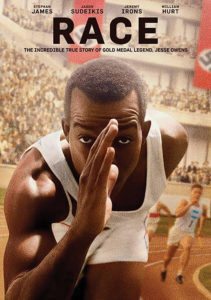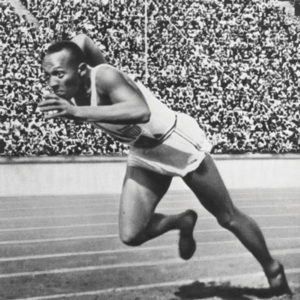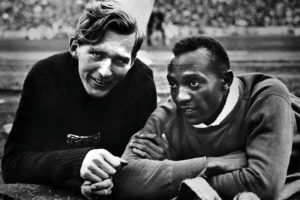SPORTING HEROES JESSE OWENS
 Recently whilst watching cable TV during lockdown I found the same films “doing the rounds”. Now usually this can be quite tedious, but I have to say that there are some films that I am happy to watch over and over again. One such film is “Race” the story of Jesse Owens.
Recently whilst watching cable TV during lockdown I found the same films “doing the rounds”. Now usually this can be quite tedious, but I have to say that there are some films that I am happy to watch over and over again. One such film is “Race” the story of Jesse Owens.
A lovingly made portrayal of surely one of the greatest sporting heroes of our time – or in fact any time!
James Cleveland Owens was born on September 12th 1913, in Oakville, Alabama. A track and field athlete, he set Junior High School records by clearing 6 feet in the high jump and leaping 22 feet 11 3/4 inches in the running broad jump, now known as the long jump. He also won all of the major track events, including the Ohio state championship for three consecutive years and set a new world record whilst still at high school by running the 100 yard dash in 9.4 seconds.His sensational high school track career resulted in him being recruited by the Ohio State University.
However, he is best known for being the  first American to win four gold medals in a single Olympic Games: 100 metres, Long jump, 200 metres, and Team Relay
first American to win four gold medals in a single Olympic Games: 100 metres, Long jump, 200 metres, and Team Relay
Not just any games either but the1936 Olympic Games in Berlin!
Jesse Owens’s wins were an obvious blow to Adolf Hitler, given that his plan for the games that year was to demonstrate the superiority of the Aryan Master Race. Owens put paid to this, not only by winning 4 gold medals but by doing it in such a spectacular manner. He made sporting history when he broke five world records and equaled a sixth in the space of 45 minutes. One of these world records, 8.13m in the long jump, would last for 25 years.
 Jesse Owens’s tremendous achievements were bravely documented at the time by German, female filmmaker Leni Riefenstahl. Also the German athlete Luz Long who won the silver medal, the first to congratulate Owens and posed together with him for photos – they also walked arm-in-arm together. As Owens himself said “It took a lot of courage for him to befriend me in front of Hitler”
Jesse Owens’s tremendous achievements were bravely documented at the time by German, female filmmaker Leni Riefenstahl. Also the German athlete Luz Long who won the silver medal, the first to congratulate Owens and posed together with him for photos – they also walked arm-in-arm together. As Owens himself said “It took a lot of courage for him to befriend me in front of Hitler”
Luz Long and Owens remained good friends and corresponded after the 1936 games. In his last letter, Long wrote to Owens asking him to contact his son and tell him about his father after his death and “what times were like when we were not separated by war. I am saying—tell him how things can be between men on this earth.”
